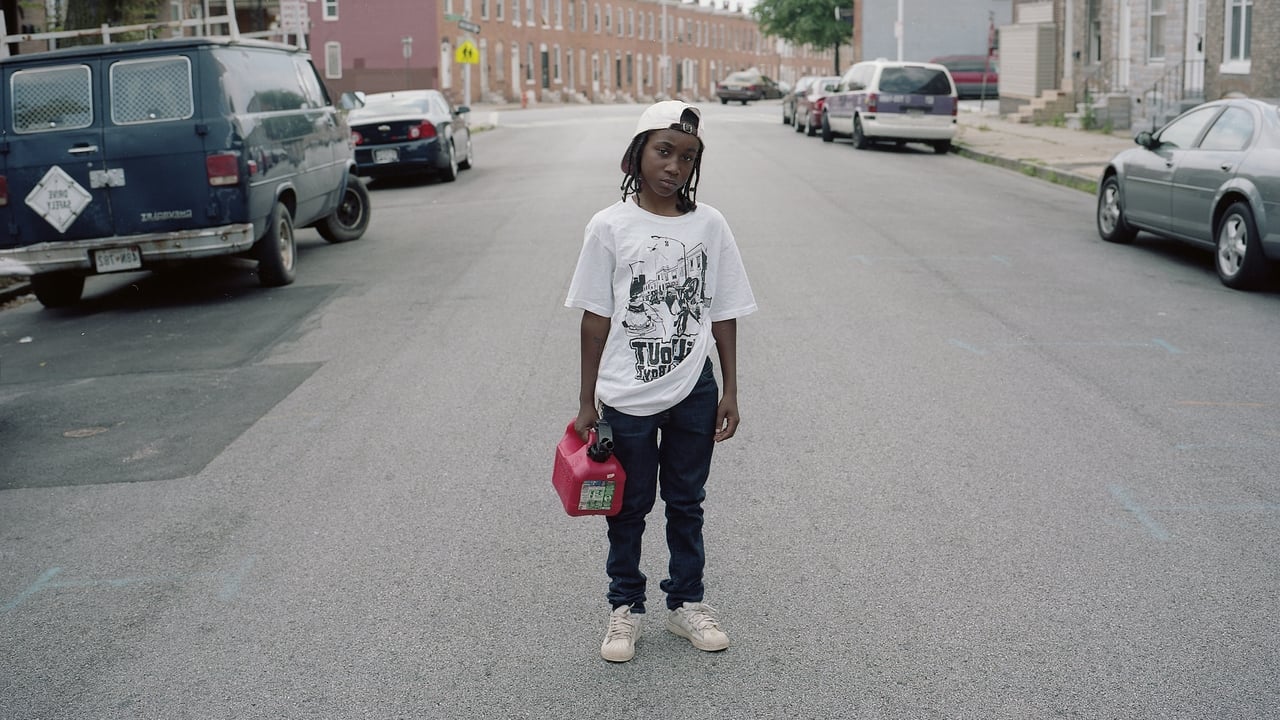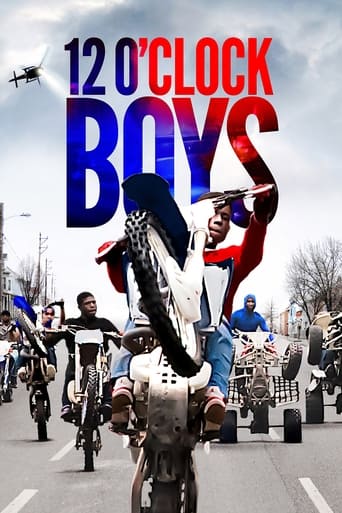blazeaglory-18319
I am reviewing the DOCUMENTARY and not the actual content.This documentary was itself, the camera work, the topic, etc was awesome. Thats was we are rating here, not a social idea or opinion. That is what FOX news and MSNBC boards are for...Yes the content was/is graphic. This documentary in no way glorifies the content. It merely presents it. So for the two reviews below who rated the content and actual societal view/opinion, instead of rating the actual documentary with its production, etc...If you/they want a debate on the ills of society, don't do it here. This is a website to review movies/documentary's.
Gregory Porter
12 O'Clock Boys is the name of a motorcycle group (one might argue that they aren't quite a gang) in North Baltimore. Their name arises from the fact that when they do wheelie's (that is, riding on the back wheel of their motorcycles) their wheels are straight up and down like the hands of a clock.12 O'Clock Boys is also the name of a documentary which follows Pug, a thirteen- year-old kid who wants to eventually join the illustrious (or notorious, depending on who you ask) aforementioned group.Many documentaries I've seen about gangs focus strictly on the gang: its origin, current members, former members, and police. 12 O'Clock Boys incorporates those but, as it follows the development of Pug, we come to see the larger ecosystem of Baltimore; not only do we see the gang and its relationship with the police but also we get to see how the gang operates with Baltimore and the poorer districts of the city, and even its relationship with future members, i.e. children.Pug's home life is such that I can see how one might be drawn to the 12 O'clock Boys and the resulting sense of community. It's kinda sad to watch over the course of the movie how Pug gravitates towards an angrier lifestyle. He wanted to become a veterinarian and he had a bunch of pets but by the end of the movie he says that he wants to become a dogcatcher (I suppose because it sounds tougher). It's too bad too because, when he talks about animals, he sounds rather knowledgeable about them.I read in an interview that Pug and his mother participated in the documentary because they wanted to shed light on the group. If people had a place to ride their bikes, like a park, they argue, then the problems would go away. But, is that really the case? Thinking about this is one of the more interesting questions to come out of the movie.On one hand we have the founding members saying that they just wanted to ride, because when they ride they forget about their problems, yadda yadda yadda. Former and current members interviewed, insist that the gang doesn't do anything like guns or drugs or whatnot; they just want to ride their bikes. And, yet, they break traffic laws and intentionally ride past the police department to exacerbate the already tenuous relationship with the police.We see Pug practicing with a child-size ATV and, eventually, in the park on his dirt bike. The plan is always to practice and ride until he gets to the point where he can ride with the group in the streets. There's the rub.What would the dynamic be if the group had a venue for their riding? Would it be the same or is part of it the experience breaking the law?At one point, the group is riding up and down a street and in a nearby park when the police come. The environment is electrified by the clash between the bikers and the police. So it's not "just about riding," but the movie doesn't really explore what it really is about.If you've read my previous reviews, you might recall that I generally dislike children in movies. More often than not, it's a cheap way to force an emotional response from audiences. 12 O'Clock Boys is pushing it. With Pug, we see this kid come of age and watch his development. But because he's a kid, it feels mildly exploitative.With respect to following Pug, there are a couple standout sequences. First, when Pug finally gets a dirt bike. He is practicing in the park near a group of kids playing basketball and one comes over and asks if he could try out Pug's bike. After some hesitation, Pug lets him. Sure enough the kid says, "I'm just going to take it around the block." The kid speeds away. After a few minutes, Pug runs around the corner to see if he'll return. You can see fear, desperation, embarrassment, and frustration wash over his face as he looks at the camera and then the cameraman. It feels like a really great moment to capture on screen.At the end of the movie, Pug has spiraled further into the hood mentality. He had just gotten in trouble for fighting in school. The cameraman asks what Pugs intends to do about his bike. "Steal it back," Pug answers matter-of-factly. As he explains the plan, footage of the robbery plays. The movie ends with a shot of Pug in the back of a van dressed in black, with his bike, looking silently at the camera. It's depressing but well executed.I've spent a lot longer thinking about this movie than countless other's that I've seen and I can't quite figure out why. I think it has something to do with why I found it unsatisfying. We watch Pug spiral downwards into the subculture of the 12 O'Clock Boys, which is depressing, right? We hear positive messages from the current and former members but we see contradictory images: a guy kicking the tail light of a police car, for example. The stories and images paint of picture of this group and it's surrounding city but it's not getting anywhere.I don't think a movie should necessarily a definitive position but I feel like it would be helpful to provide a starting point and, perhaps, a direction for conversation. It you watch fluffy tupolev's Youtube video entitled "12 O'Clock Boys", you'll have just as much of a conversation starter as 12 O'Clock Boys. If you are interested in watching it, currently, it can be found on Youtube.
Estacio O'Macy
I love motorcycles, so I thought I'd like this movie. I did like it, but I was surprised to find it wasn't really about motorcycles. It was about a young pup of a kid that seemed like he could grow up to be a veterinarian, but year after year that light fades. It was more about a social setting than motorcycles. It's about hope or lack of. It's about not having (or seeing) any opportunity. I saw no glorification. The subjects might have built the wheelies up, but the filmmaker provided counterpoints. I saw no answers. They weren't preaching. There really weren't even any questions. I would have liked to have had real periodic interviews with the kid, Pug, to see where his head was. Seems like a lot of people don't like the movie, because they don't like the subject. At the end of the day, it isn't a bad film to start a conversation.
Seth_Rogue_One
A pretty unique and interesting look at urban life about some dirt-bikers in Baltimore. Which of course is most known for being the main ground for the TV-series THE WIRE.It focuses mainly one one kid called Pug who wants nothing more but to join the 12 O'Clock Boys "gang", I use that term lightly cause they aren't really a gang per se because the only illegal activities they do is ride their dirt-bikes on the streets where they are not allowed, performing various stunts etc. They also interview some "street-legends" of the original 12'O Clock Boys who started out years ago and is still about that life.It's a documentary the way it should be done, it doesn't try to push an agenda on you or condone the illegal activities nor show disdain for it, it just show you the way it is and how they use the riding as a release for whatever problems they have got going on.

